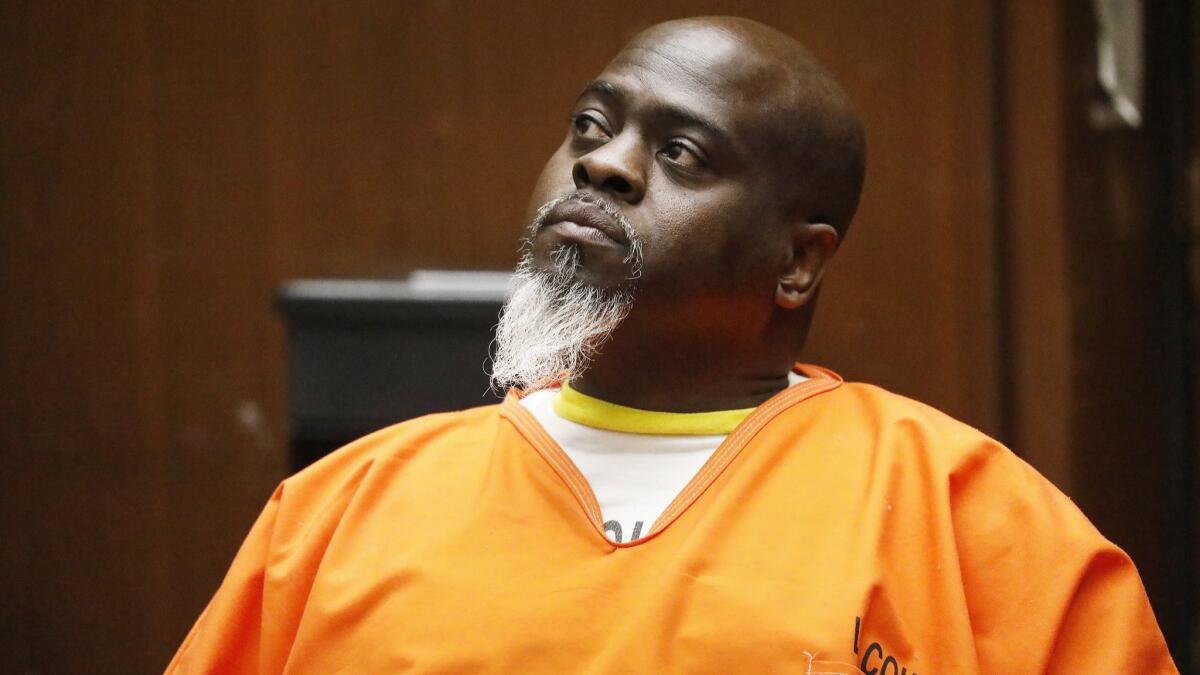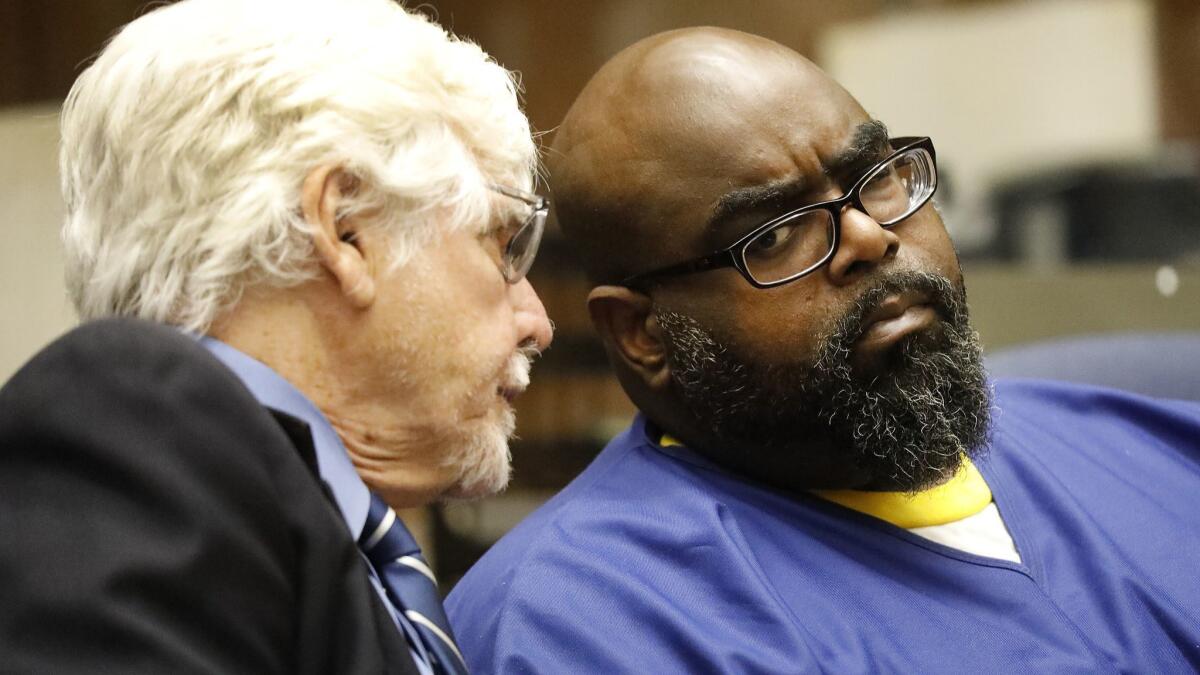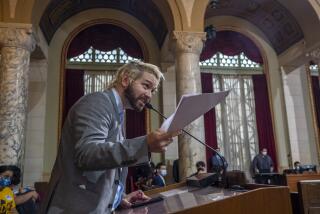LAPD detective’s use of the N-word roils infamous gang murder case

At a Little Tokyo bar, drinks fueled a heated discussion among a group of lawyers and a Los Angeles police investigator.
Then talk turned to police corruption.
Veteran LAPD Det. Brian McCartin told his three companions about his experience encountering black gang members. He referred to them using the N-word.
“What, you’ve never used that word in the privacy of your own living room?” he asked when the slur was met with shock, according to court documents.
Among the group was Deputy Dist. Atty. Robert Rabbani, who was prosecuting Cleamon Johnson, a black gang leader known as “Big Evil” and charged with five murders. McCartin was his lead investigator.
The May 2014 conversation, which was not turned over to the defense until earlier this year, has become a thorny legal issue in the pending death penalty case against Johnson and offers a glimpse inside a police department that tried over the last two decades to weed out the systemic, casual racism that was once an inherent part of its culture.
Johnson’s attorneys argue that Rabbani should be disqualified from the case because he failed to hand over evidence of a law enforcement officer’s racial bias, despite their repeated requests for exculpatory evidence. By law, prosecutors are required to turn over “Brady” evidence — named for a landmark Supreme Court decision — which includes information that could undermine the credibility of government witnesses.
They also argue McCartin’s words suggest that racism permeated his entire investigation.
“The willful and deliberate cover-up of the incident in which McCartin’s racist beliefs were expressed brings into question … what other forms of racism or inappropriate conduct have been suppressed and what each agency feared in exposing this particular incident,” defense attorney Stephen Dunkle wrote in his motion for an evidence hearing.
Los Angeles Superior Court Judge Curtis Rappe denied the motion in March, ruling that Rabbani had acted in good faith by reporting the exchange to his office’s discovery compliance unit.
A prosecutor with the unit at the time concluded that McCartin had been referring specifically to gang members and that his use of the slur “taken in proper context, does not provide circumstantial evidence that he is biased against African Americans,” according to court documents.
An appellate court panel of three judges ultimately sided with Rappe, although one dissented. The matter now rests with the state Supreme Court, which will determine whether the defense is entitled to a hearing that looks more closely at how prosecutors handled the incident.
McCartin left the department in June 2015, taking a $485,000 payout as a member of the agency’s deferred retirement program, as well as an annual pension. Records show he now resides in Arizona. He could not be reached for this story.
The Los Angeles County district attorney’s office said in a statement to The Times that it does not condone McCartin’s language and that its legal analysis was conducted only to determine if the detective’s comment was so racially biased that it had to be disclosed to the defense.
Johnson’s defense attorney, who declined to comment to The Times, said in court documents that the appellate ruling could lead to “recusal of other members of the district attorney’s office or the office as a whole, as well as other possible sanctions.”
An LAPD spokeswoman said the agency conducted an investigation into McCartin’s comments, but declined to comment further.

A deadly reputation
McCartin, who joined the department in 1983, spent years patrolling South Los Angeles. He was eventually put on the investigation into Johnson, whose Blood-affiliated gang, the 89 Family Swans, had a deadly reputation.
In 1997, Johnson, along with Michael “Fat Rat” Allen, was sentenced to death in connection with the killing of Donald Ray Loggins and Payton Beroit, who lived in rival gang territory. Fourteen years later, the state Supreme Court voided the decision, ruling that the judge improperly removed a juror from the trial.
Separately, Johnson was charged with the 1991 murder of Tyrone Mosley, who was shot at a gang party. Johnson acted as his own legal counsel. The 1999 case was thrown out after the jury deadlocked.
On May 13, 2014, prosecutors retracted the first indictment and filed a new complaint against Johnson and Allen.
Both men are again accused of killing Loggins and Beroit. Johnson is charged with the deaths of Mosley as well as two additional murders — of Albert Sutton in 1992 and Georgia Denise Jones in 1994 — and the attempted murder of Kim Coleman in 1991.
Johnson’s attorneys argued the prosecution’s move was vindictive. While an appellate court said there was sufficient evidence to raise the issue, it denied the motion to dismiss the case.
Debate turns ugly
The day after the new charges were filed, Rabbani wanted to thank his investigator over drinks.
Bringing along Leslie Hinshaw, a law clerk with the district attorney’s office who is now a prosecutor, Rabbani met up with McCartin at Justice Urban Tavern in downtown Los Angeles.
The trio eventually made their way a couple of blocks over to Far Bar, where they mingled with other attorneys and watched the Stanley Cup playoffs.
Peter Arian, then a deputy federal public defender, joined them. The group’s discussion grew heated as they debated controversial topics like drone strikes, Guantanamo Bay and the death penalty.
At some point, Arian suggested that corruption within the Los Angeles Police Department was pervasive.
McCartin responded with expletives and talked about his experience with gang members.
His remarks were detailed in statements written by Rabbani and Arian. Hinshaw recorded her recollection of the night. The three accounts, filed in court in February of this year, varied in details, but the takeaways were similar.
Rabbani wrote that McCartin “said something to the effect of, ‘I was out there with those niggers.’ … Referring to the gang members, he then stated, ‘They call themselves that.’”
Rabbani and Hinshaw said the detective then suggested it was not unusual to use the slur in one’s own home.
In an email he wrote to himself to memorialize the incident, Arian didn’t mention gang members but said McCartin used the slur while making a comparison of black residents.
Rabbani, Arian and Hinshaw responded that it was racist and inappropriate. The group awkwardly dispersed.
In a statement submitted to his office about three weeks later, Rabbani said he had known McCartin professionally for two years and had never heard the detective “express any kind of bias towards anyone, whether race-based, gender-based, religion-based or otherwise.”
Rabbani later notified McCartin that he was looking into whether the racial slurs needed to be disclosed to the defense.
“Detective McCartin expressed concern that he may lose his job. I told him … it was my legal obligation to pass this information on to my supervisors,” Rabbani said in court documents.
In June 2017, the district attorney’s office notified the LAPD that McCartin had been added to its list of officers with credibility issues, according to court documents. Eight months later, the office informed Johnson’s attorney about McCartin’s racist comments.
By then Rabbani, although still assisting with the case, had stepped aside as lead prosecutor due to health issues. Deputy Dist. Atty Jonathan Chung took his place.
“It’s clear that McCartin’s statements were, as counsel is saying, disturbing. They were, in a way, racist,” Chung said at a March hearing, according to a transcript of court proceedings.
“They have to be understood in the context of where they were said and why they were said. … It wasn’t racist in the sense that he was generalizing all African Americans with that general pejorative. What he was saying was that he had a particularly nasty view as it related to gang members.”
The district attorney’s office said although prosecutors found in 2014 that they were not legally required to disclose McCartin’s statements, they did so in February “in an abundance of caution.”
Chung, Rabbani, Hinshaw and Arian declined to comment.
Johnson, 50, who was on death row at San Quentin State Prison before being transferred to a Los Angeles county jail, is expected to face trial next year.
Complaints persist
Decades of reforms at the LAPD have remade a department where officers once exchanged virulently racist messages over their patrol car computers with impunity. Since that era, the LAPD has undergone vast changes in terms of diversity, tactics within communities of color and discipline of openly racist attitudes.
Longtime LAPD critics acknowledge the improvements, but complaints of racial profiling, excessive force against nonwhite residents and racism persist.
In 2014, police officials and a disciplinary board recommended the removal of LAPD Officer Shaun Hillmann, who was caught on tape referring to a black man as a “monkey,” among other slurs. Hillmann, whose father and uncle worked for the department, had his job saved by LAPD Chief Charlie Beck, who instead imposed a 65-day suspension.
Later, Det. Frank Lyga was recommended for termination after making racially charged statements, including one about a black off-duty officer he fatally shot. “I could have killed a whole truckload of them, and I would have been happy doing it,” he said.
Lyga retired before he could be fired and was eventually awarded a $50,000 settlement from the city after filing a discrimination suit that alleged a black officer would not have been fired for the same comments.
Civil rights attorney Connie Rice, a longtime critic of racism within government institutions who has advised recent LAPD chiefs on reforming the department’s culture, said the McCartin incident appeared to be more of a failure of the district attorney’s office.
“This is more about the prosecutorial culture that hasn’t changed,” Rice said. “They’re still stuck in a mindset that you don’t prosecute cops, you don’t hold cops accountable. ... They’ve got too much baggage from the old culture, and they should have turned this information over.”
Twitter: @corinaknoll
More to Read
Sign up for Essential California
The most important California stories and recommendations in your inbox every morning.
You may occasionally receive promotional content from the Los Angeles Times.











